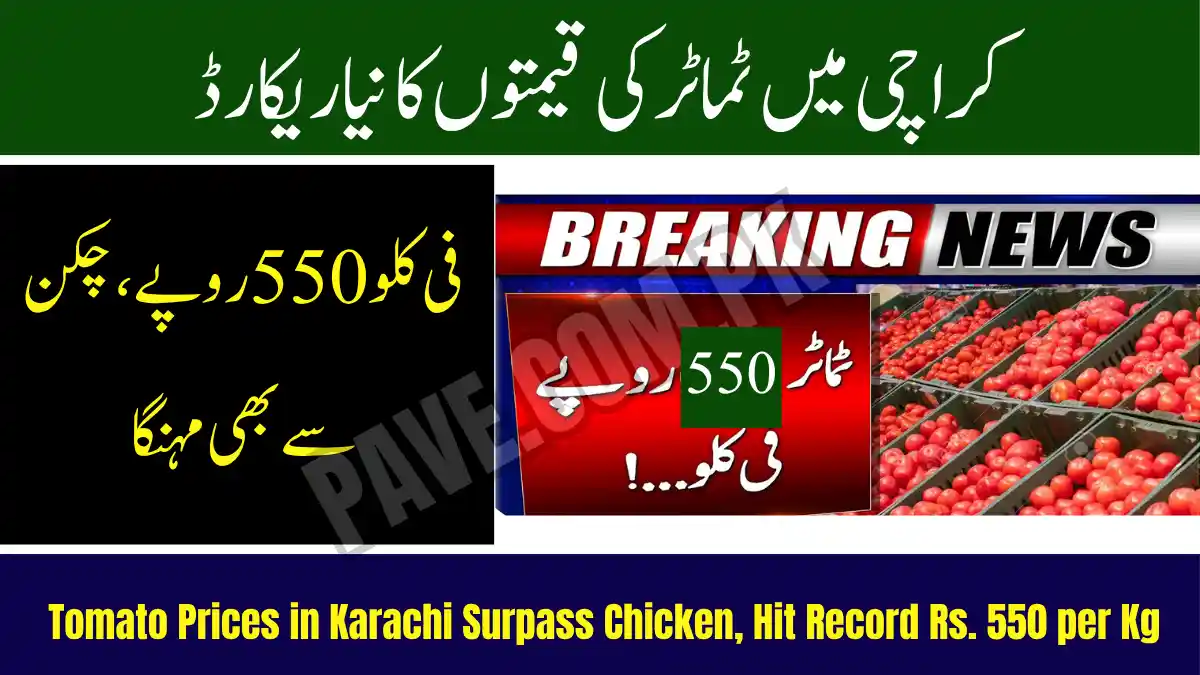Breaking News: Tomato Prices in Karachi Surpass Chicken, Hit Record Rs. 550 per Kg
Karachi’s residents woke up to another inflation shock as tomato prices in Karachi surged past the price of chicken, touching an unprecedented Rs. 550 per kilogram in several city markets. The dramatic increase, driven by limited local supply and the suspension of Afghan imports, has made tomatoes one of the most expensive commodities in the city’s kitchens.
According to the official rate list, the retail price of tomatoes should be Rs. 280 per kilogram, but the reality across grocery stores, markets, and even Bachat Bazaars paints a grim picture. Vendors say they have no choice but to sell at higher rates due to inflated wholesale prices and supply shortages.
“Tomatoes have become as precious as jewelry,” said a local buyer in Gulshan-e-Iqbal. “We used to buy a kilo for Rs. 80–100 a few months ago. Now it’s competing with chicken.”
Traders Blame Import Shortfall and Iranian Dependence
Market insiders confirm that nearly 90% of Karachi’s tomato demand is currently met through imports from Iran, as supplies from Punjab and Balochistan remain limited. The city’s reliance on Iranian tomato imports to Pakistan has left consumers vulnerable to sharp price fluctuations due to cross-border trade costs, customs duties, and transport delays.
The situation worsened after Afghan tomato supply halt, which further disrupted the regional balance. For years, Afghanistan has been a steady supplier of fresh tomatoes to Pakistan’s western and southern provinces, but the closure of trade routes has caused a sudden shortfall in availability.
“The Afghan border disruption and transportation expenses have created a supply vacuum,” explained a wholesaler at Karachi’s Super Highway Sabzi Mandi. “Iranian tomatoes are costlier, and freight costs have doubled, leaving us no room to sell cheaply.”
This dependency on imports has made tomato price today Karachi highly volatile — and experts warn that rates may continue to rise until local crops from Sindh arrive in the markets.
Sindh Tomato Crop 2025: The Awaited Relief
Agriculture officials predict that prices will begin to stabilize once the Sindh tomato crop 2025 begins to reach markets in November. However, for now, the harvest in lower Sindh districts like Thatta, Badin, and Hyderabad is still in its early stages.
“The next three to four weeks are crucial,” said an official from the Sindh Agriculture Department. “Once Sindh’s crop reaches full yield, prices should drop below Rs. 200 per kilogram. But until then, Karachi will remain under pressure due to dependency on imported supplies.”
The government is also monitoring crop health and logistics closely to ensure that the upcoming tomato harvest can offset the shortage before winter demand peaks.
Read More: Government Approves Wheat Policy 2025
Karachi Vegetable Inflation Hits Record Levels
The surge in tomato prices in Karachi is part of a broader wave of Karachi vegetable inflation, where multiple essential vegetables have seen steep price hikes. In recent weeks, onions, green chilies, garlic, and coriander have all witnessed price increases of up to 40%.
This inflation has hit low- and middle-income families hardest, with many households forced to cut down on their daily vegetable consumption. Small restaurants and food vendors have also been impacted, as tomato-based curries and sauces have become significantly more expensive to prepare.
“We’ve started substituting tomatoes with yogurt and tamarind pulp in gravies,” said a restaurant owner in Federal B Area. “Customers notice the difference, but we can’t keep absorbing these prices.”
Economists attribute this inflation to a combination of factors: border restrictions, rising fuel costs, devaluation of the rupee, and poor cold storage infrastructure — all of which have contributed to market instability.
Retailers Cry Foul: ‘We’re Not the Culprits’
While customers are venting frustration at local vendors, shopkeepers insist that they are victims of the same broken system. Many retailers claim that they are forced to buy tomatoes at Rs. 400–450 per kilogram from wholesalers, leaving little to no profit margin.
“People blame us, but the real issue starts in the mandi,” said Rashid Ahmed, a vegetable seller at Saddar Market. “We’re buying expensive, paying high transport costs, and dealing with daily price changes. Selling at official rates would mean losing money.”
According to the city administration’s official rate list, tomatoes should be sold at Rs. 280/kg, but no market in Karachi has managed to meet that target due to the inflated supply chain.
The Commissioner Karachi’s Price Control Team carried out inspections in Bachat Bazaars and neighborhood stalls this week. Officials confirmed that several stalls were sealed for selling above the official price, but admitted that enforcement alone cannot fix a supply-driven crisis.
Iranian Tomato Imports Pakistan: A Temporary Lifeline
With limited local production and halted Afghan imports, Iranian tomato imports to Pakistan have become the city’s primary source of supply. However, traders note that this dependency has come at a high cost.
Iranian tomatoes, often transported through Taftan and Balochistan routes, are priced in foreign currency, with logistics expenses and customs tariffs adding to retail inflation.
Each imported truck of Iranian tomatoes costs nearly twice as much as domestic consignments, resulting in inflated retail prices in Karachi’s markets. Additionally, delays at border checkpoints and fuel price fluctuations have caused further supply interruptions.
Analysts warn that over-reliance on imported produce exposes Pakistan’s urban markets to unnecessary risk and currency shocks, urging policymakers to focus on domestic production, cold storage, and modern logistics networks.
Read More: Breaking News: Punjab School Winter Holidays 2025 Official Dates
Government Response: Price Control Measures Underway
The Sindh government and Karachi administration have launched special monitoring teams to curb profiteering. According to officials, strict penalties are being imposed on wholesalers and retailers found violating official pricing.
“We’re aware that prices have gone out of control,” said a spokesperson from the Commissioner Karachi Office. “We’re coordinating with agriculture and trade departments to stabilize the market and increase supply in coming days.”
Authorities have also hinted at temporary import relaxations to allow higher inflows from Iran and other neighboring countries until Sindh’s local crop hits the market.
Meanwhile, the Pakistan Bureau of Statistics (PBS) has reported a 20% increase in the national Consumer Price Index (CPI) for vegetables, indicating a larger trend of food inflation across Pakistan, not just Karachi.
Public Reaction: Anger and Humor Over Skyrocketing Prices
The price hike has sparked public outrage — and satire. Social media platforms are filled with memes joking about locking tomatoes in safes, gifting them at weddings, and comparing them to luxury goods.
Despite the humor, citizens are frustrated by the rising cost of living and the government’s inability to enforce real-time market regulation.
“First onions, now tomatoes — what’s next?” wrote one user on Facebook. “At this rate, we’ll soon need loans just to make curry.”
Tomato Prices in Karachi 2025 Conclusion: A Crisis Rooted in Dependence and Mismanagement
The Tomato Prices in Karachi crisis highlight deeper issues in Pakistan’s agricultural and trade systems — dependence on imports, lack of planning, and poor market oversight.
While the government’s short-term measures may offer temporary relief, experts stress that long-term solutions lie in domestic crop development, improved storage infrastructure, and regional trade diversification.
Until then, Karachi’s residents continue to face record-breaking tomato prices, transforming one of the city’s most basic food items into a symbol of inflation and economic imbalance.







